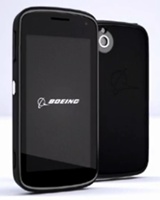Boeing launches ultra-secure smartphone
28 Feb 2014
Boeing Co is hardly associated with smartphones in people's minds, yet the aircraft manufacturer has launched a phone that is spy-proof.
 Not only does it have a built-in encryption system, but any attempt to open the casing of the Boeing Black Smartphone deletes all data and renders the device inoperable, saving critical data from falling into wrong hands.
Not only does it have a built-in encryption system, but any attempt to open the casing of the Boeing Black Smartphone deletes all data and renders the device inoperable, saving critical data from falling into wrong hands.
Boeing's tamper-proof phone won't be available to even the wealthy just yet, though. It is aimed at government agencies and contractors who need to keep communication and data secure, according to Boeing and filings with the US Federal Communications Commission.
The secure phone marks an extension of the communications arm of the Chicago-based aerospace and defence contractor, which is best known for jetliners and fighter planes.
"Despite the continuous innovation in commercial mobile technology, current devices are not designed from inception with the security and flexibility needed to match their evolving mission and enterprise environment," Boeing said.
It added, "The Boeing Black smartphone was designed with security and modularity in mind to ensure our customers can use the same smartphone across a range of missions and configurations."
Such a phone might have prevented damage to Washington's diplomacy in Ukraine from a leaked telephone call. A senior US State Department officer and the ambassador to Ukraine apparently used unencrypted cellphones for a call about political developments in Ukraine that became public.
The Boeing Black, made entirely in the US, runs on Google Inc's Android operating system; but in a highly modified version.
The 5.2-by-2.7-inch (13.2-by-6.9 cm) handset, slightly larger than an iPhone, uses dual SIM cards to enable it to access multiple cell networks. It can operate on the WCDMA, GSM and LTE frequency bands, with WiFi and Bluetooth connectivity. the phone can be configured to connect with biometric sensors or satellites. Other attachments can extend battery life or use solar power.
Boeing is releasing few details about the wireless network operators or manufacturer it is working with, and has not provided a price or date by which the phone might be widely available, but said it has begun offering the phone to potential customers. The company is not naming wireless carriers and handset makers it is working with and not disclosing the price.
Boeing has been developing the phone for 36 months, said Boeing spokeswoman Rebecca Yeamans. She added that Boeing combined its own engineers with the talent of people who joined Boeing recently through acquisitions that included Argon ST Inc, Digital Receiver Technology Inc, Kestrel Enterprises Inc, Ravenwing Inc, and Solutions Made Simple Inc.
"We saw a need for our customers in a certain market space" that Boeing could meet with its technology expertise, Yeamans said.
A sample purchase contract submitted to the FCC says the phone would be sold directly by Boeing or its agents.
Word of the new phone appeared on tech sites last year, but the revelations Wednesday marked the first clear picture of the device. A video and product card on Boeing's website show how users can attach components to reach special networks, expand the battery or attach biometric sensors.
Boeing designed the phone to be used "primarily by governmental agencies and their contractors to ensure that data and voice communications undertaken by their respective employees are transmitted and stored in a highly secure manner," the company said in the FCC filings. Boeing requested confidential treatment of details of the product in its application for FCC authorization of the equipment.
On its website, Boeing said the phone provides data encryption and uses a special architecture that "ensures the device starts in a trusted state, enabling maximum security of data".
In addition, "the Boeing Black phone is manufactured as a sealed device both with epoxy around the casing and with screws, the heads of which are covered with tamper proof covering to identify attempted disassembly," the FCC documents said. "Any attempt to break open the casing of the device would trigger functions that would delete the data and software contained within the device and make the device inoperable."
Boeing already provides secure communications for US government officials, including the president.



















